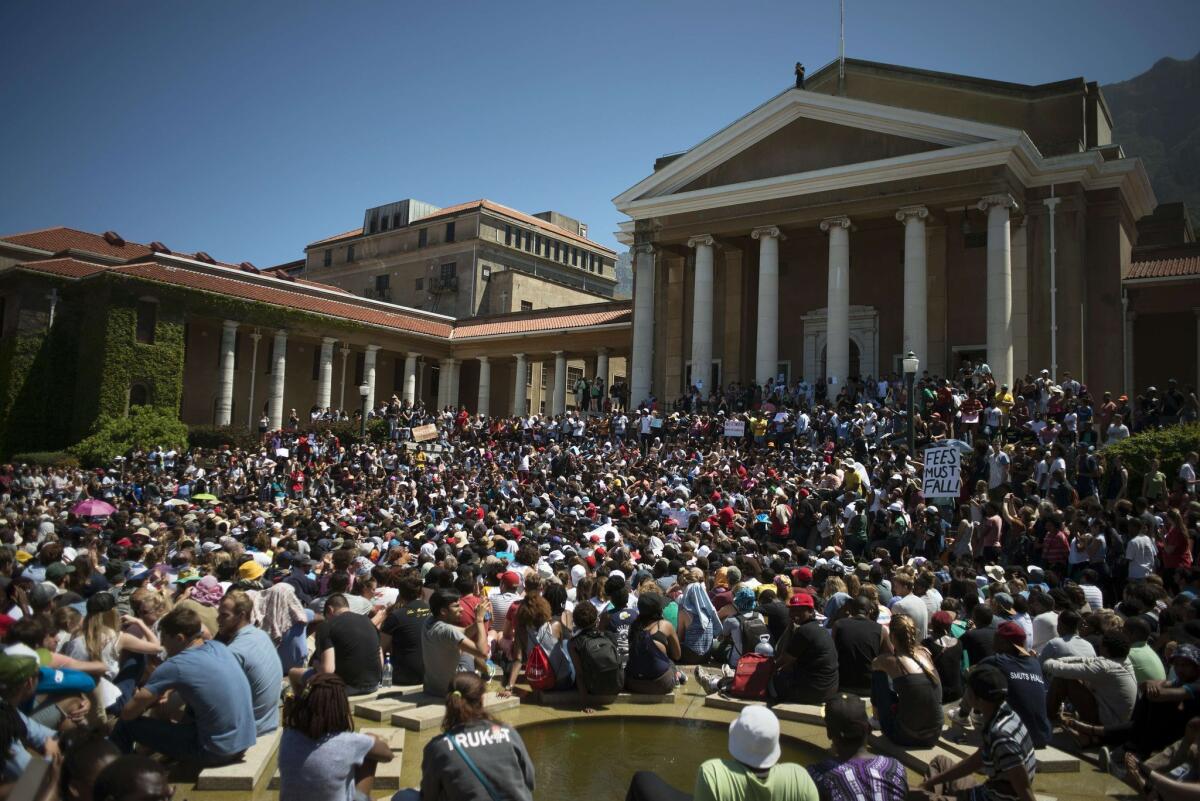With exams just days away, why are South African students protesting instead of studying?

Thousands of students converge at the University of Cape Town on Oct. 22 for a meeting about fee hikes in South African educaiton institutions.
- Share via
reporting from JOHANNESBURG, South Africa — She is the daughter of unemployed parents in the crowded, rat-infested township of Alexandra, the first member of her family to make it to university. She’s a law student who dreams of becoming chief justice one day.
At night, Kgothatso Ledwaba studies, with exams just days away. But during the day, the 21-year-old third-year student marches and shouts, dances and sings protest songs as part of a wave of student protests across South Africa that has shocked the African National Congress government and embarrassed government ministers.
The students’ protest #FeesMustFall is emblematic of wider concerns: an economy that fails to offer university and high school graduates opportunities, and a government out of touch with the anger of ordinary South Africans and unable to improve education or health services.
A wave of student protests has swept across the country, all year: There were the #RhodesMustFall protests at the University of Cape Town, which led to the removal of a statue of the racist colonial leader Cecil John Rhodes, who donated the land for the university. Then came #OpenStellenbosch, a student protest movement opposed to teaching in the Afrikaans language at universities.
Campuses across South Africa erupted last week after universities announced plans to hike 2016 tuition fees by up to 11.5%, when government loans for needy students had fallen in real terms, leaving thousands of them out in the cold. The state-funded National Student Financial Aid Scheme allocated $731 million for loans for needy students in 2016.
About two-thirds of the 33,364 students at the University of Witwatersrand (known as Wits University) are on scholarships, but many students have to cover shortfalls. For Ledwaba, who studies at Wits University, the nearly $1,800 she has to cover from her own pocket is impossible to pay; she can’t find part-time work during school, and earns just $1.38 an hour as a cashier in a clothing store during her vacations in June and December.
“I haven’t paid. I haven’t been affording it,” she said, fearing that next year “I’ll have to sit at home because there’s nothing I can do. It’s very frustrating and very stressful. It makes me very angry to think of that.
“I have been here for three years, working hard, not sleeping, Monday to Sunday. I want to be a lawyer, a very good lawyer. I’d like to … specialize in criminal law. I know that one day I’d like to be the chief justice.”
For students such as Ledwaba and her close friend, fellow Wits student Tsureletso Matlholoa, 23, an education major, being the first in their families to get to university is an honor but also brings a huge burden of family pressure.
“There’s pressure from the family because they’re looking up to us to make it and help them,” said Ledwaba.
“I am the first child and I’m the first one ever to get to university. They’re proud of me: ‘She made it. She did what we could not.’ They’re waiting for me to finish this lap,” said Matlholoa. “Some of us can’t afford to pay here, but we are working our butts off.
“I just want to get my degree and help my family,” she said, adding that once she gets a job she’ll have to support her 14-year-old brother, Kopo, and pay his university tuition.
Her mother, a security guard, and her father, unemployed and recently out of jail, had to borrow money from friends and relatives to cover the gap between her scholarship and tuition fees this year, but there’s no chance they could do that again next year to cover her share of the fees.
After more than two decades of ANC governance, South Africa lacks decent elementary and secondary education, particularly in math and science. A 2012 study by Stellenbosch University found that a quarter of children hadn’t mastered basic literacy and numeracy by the end of elementary school.
Ledwaba blamed the government for inadequate funding for needy students.
“We’re in a crucial moment,” said analyst William Gumede of the South African think tank Democracy Works Foundation. “The ANC is in power, but it doesn’t have [moral] authority and this is one moment where you can see it in real time.
“It’s almost like the ANC leaders are out of touch with what’s happening in the black community. It’s like a little bubble of power and patronage out of touch with what’s going on. The ANC structurally now is unable to respond. It’s almost too ossified now.”
A gaffe by Higher Education Minister Blade Nzimande, who joked Wednesday that the government could “start our own movement called #StudentsMustFall,” increased students’ ire and underscored Gumede’s point.
“I am sorry madiba, but this is where me and ANC call it quits #studentsmustfall,” tweeted one South African, @sanchezniak, using the late ANC leader Nelson Mandela’s clan name.
Students rejected a deal hammered out by Nzimande this week to cap increases at 6%. As the crisis deepened, President Jacob Zuma announced he would meet student and university leaders Friday in a bid to resolve the impasse.
More to Read
Sign up for Essential California
The most important California stories and recommendations in your inbox every morning.
You may occasionally receive promotional content from the Los Angeles Times.













